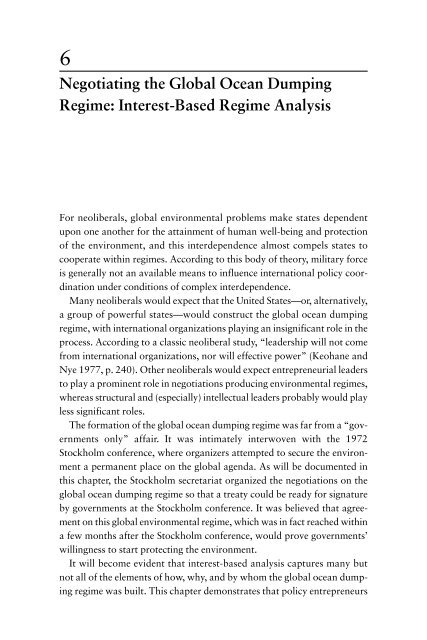Radioactive Waste Disposal at Sea: Public Ideas ... - IMO
Radioactive Waste Disposal at Sea: Public Ideas ... - IMO
Radioactive Waste Disposal at Sea: Public Ideas ... - IMO
You also want an ePaper? Increase the reach of your titles
YUMPU automatically turns print PDFs into web optimized ePapers that Google loves.
6<br />
Negoti<strong>at</strong>ing the Global Ocean Dumping<br />
Regime: Interest-Based Regime Analysis<br />
For neoliberals, global environmental problems make st<strong>at</strong>es dependent<br />
upon one another for the <strong>at</strong>tainment of human well-being and protection<br />
of the environment, and this interdependence almost compels st<strong>at</strong>es to<br />
cooper<strong>at</strong>e within regimes. According to this body of theory, military force<br />
is generally not an available means to influence intern<strong>at</strong>ional policy coordin<strong>at</strong>ion<br />
under conditions of complex interdependence.<br />
Many neoliberals would expect th<strong>at</strong> the United St<strong>at</strong>es—or, altern<strong>at</strong>ively,<br />
a group of powerful st<strong>at</strong>es—would construct the global ocean dumping<br />
regime, with intern<strong>at</strong>ional organiz<strong>at</strong>ions playing an insignificant role in the<br />
process. According to a classic neoliberal study, “leadership will not come<br />
from intern<strong>at</strong>ional organiz<strong>at</strong>ions, nor will effective power” (Keohane and<br />
Nye 1977, p. 240). Other neoliberals would expect entrepreneurial leaders<br />
to play a prominent role in negoti<strong>at</strong>ions producing environmental regimes,<br />
whereas structural and (especially) intellectual leaders probably would play<br />
less significant roles.<br />
The form<strong>at</strong>ion of the global ocean dumping regime was far from a “governments<br />
only” affair. It was intim<strong>at</strong>ely interwoven with the 1972<br />
Stockholm conference, where organizers <strong>at</strong>tempted to secure the environment<br />
a permanent place on the global agenda. As will be documented in<br />
this chapter, the Stockholm secretari<strong>at</strong> organized the negoti<strong>at</strong>ions on the<br />
global ocean dumping regime so th<strong>at</strong> a tre<strong>at</strong>y could be ready for sign<strong>at</strong>ure<br />
by governments <strong>at</strong> the Stockholm conference. It was believed th<strong>at</strong> agreement<br />
on this global environmental regime, which was in fact reached within<br />
a few months after the Stockholm conference, would prove governments’<br />
willingness to start protecting the environment.<br />
It will become evident th<strong>at</strong> interest-based analysis captures many but<br />
not all of the elements of how, why, and by whom the global ocean dumping<br />
regime was built. This chapter demonstr<strong>at</strong>es th<strong>at</strong> policy entrepreneurs

















